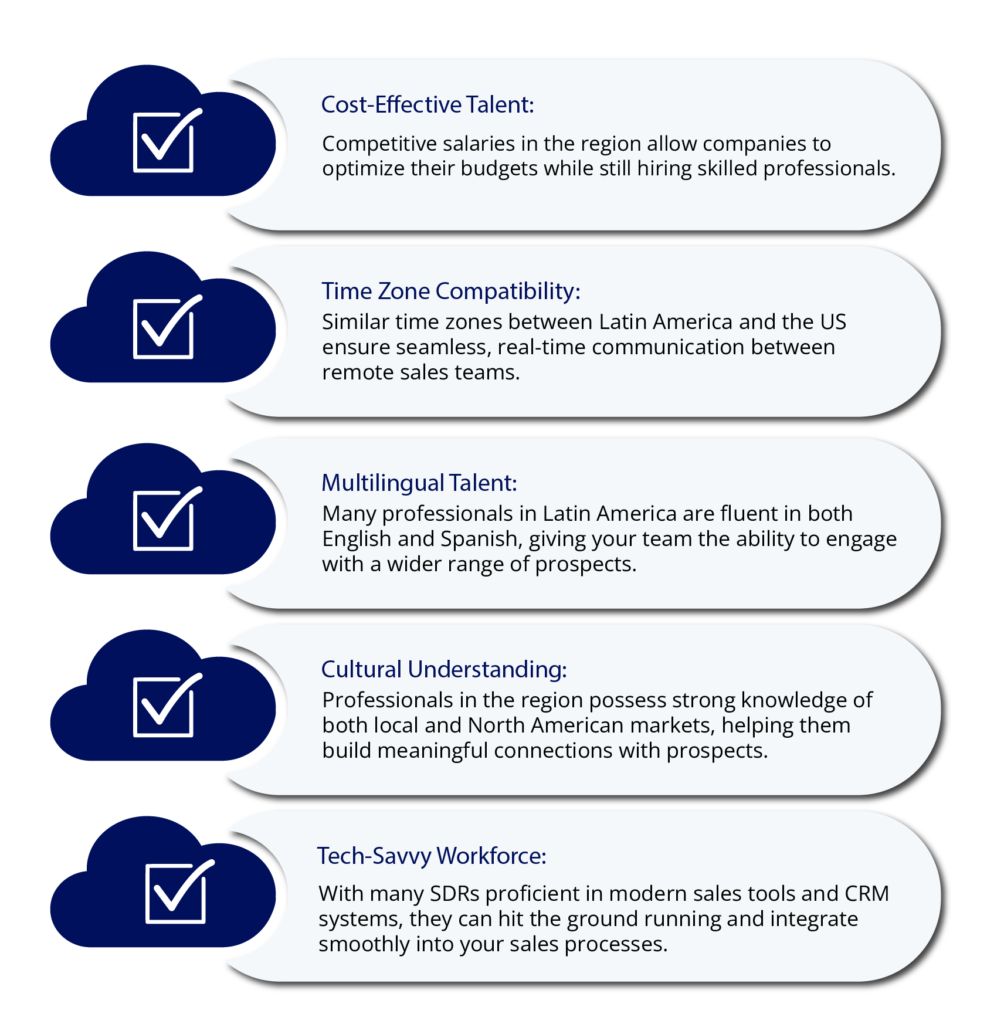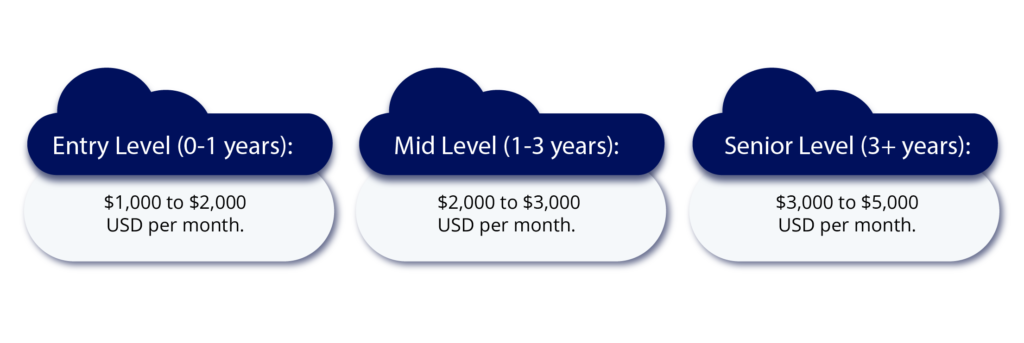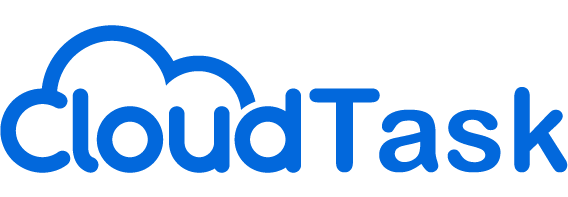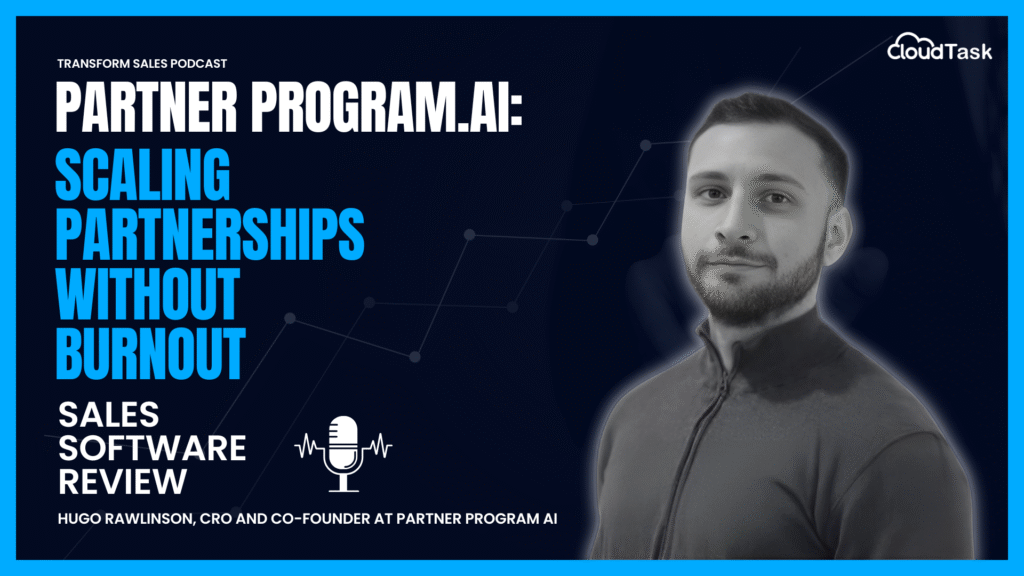Sales Development Representatives (SDRs) are vital to building and managing a strong sales pipeline.
They handle the early stages of the sales process, identifying potential leads, initiating conversations, and setting the stage for the sales team to close deals.
With the rising demand for SDRs, many companies seek remote talent, particularly in Latin America, to fulfill this crucial role.
This guide provides an overview of what to look for in a Sales Development Representative, key skills that drive success, and how you can optimize your hiring process by tapping into Latin America’s talent pool.
Additionally, we’ll cover salary expectations and how CloudTask’s Marketplace can streamline the entire process.
Why Remote SDRs from Latin America Are a Smart Choice
Hiring remote SDRs from Latin America offers companies a range of advantages.
Professionals in the region are not only skilled but bring unique value due to their multilingual abilities and cultural understanding. These qualities make them highly effective in building rapport with prospects and expanding your market reach.
Here’s why Latin American SDRs are a great addition to any remote sales team:

Key Skills to Look for When Hiring a Sales Development Representative
Identifying the right SDR candidate means looking beyond basic sales knowledge.
Successful SDRs possess a blend of interpersonal, organizational, and technical skills that allow them to deliver results consistently.
Here are the essential skills to prioritize when evaluating SDR candidates:
- Effective Communication: Look for candidates who can articulate value propositions in a direct, persuasive way across phone, email, and social media platforms.
- Active Listening: SDRs should know how to identify prospect needs and challenges by asking the right questions and carefully analyzing responses.
- Research and Prospecting Expertise: The ability to research and qualify leads using tools and data is critical for any SDR. They should know how to find the right prospects that align with your target customer profile.
- Organizational Skills: Managing multiple outreach efforts and follow-ups demands strong organizational capabilities. Top SDRs keep their pipeline moving by staying on top of tasks and deadlines.
- Resilience and Persistence: Rejection is common in sales, so it’s essential to hire SDRs who can maintain a positive attitude and continually improve their approach.
- Tech Proficiency: Familiarity with CRM platforms and other sales tools ensures that SDRs can track interactions and optimize their outreach efforts.
Salary Expectations for Remote SDRs in Latin America
Offering competitive compensation helps attract high-quality candidates, while the cost-effectiveness of remote work in this region provides great value for companies.
Salaries for remote SDRs in Latin America vary depending on experience and qualifications.
Here’s a general breakdown of salary ranges based on data from CloudTask’s Marketplace:

In addition to base salaries, many SDR roles include performance-based bonuses or commissions, allowing SDRs to increase their overall earnings by hitting or exceeding targets.
Several factors contribute to the attractiveness of these salary ranges:
- Cost of Living: Latin American countries often have a lower cost of living compared to the United States, making these salaries highly competitive within local markets.
- Career Growth: Many companies offer clear paths for advancement, with opportunities to move into senior SDR or Account Executive roles.
- Work-Life Balance: Remote work often provides greater flexibility, reducing commute times and allowing for a better work-life balance.
- Benefits: Some companies offer additional benefits such as health insurance, professional development allowances, or stock options, further enhancing the overall compensation package.
Best Practices for Hiring Remote SDRs
Hiring SDRs requires more than just reviewing resumes. It’s important to implement a process that helps you assess skills, cultural fit, and long-term potential.
Here are some practical tips for improving your SDR hiring process:
- Evaluate Role-Specific Experience: Instead of focusing solely on sales experience, look for candidates who have handled customer-facing roles or research-heavy positions. These skills transfer well to the SDR function and often lead to faster onboarding.
- Test for Adaptability: SDRs need to be adaptable. Use real-life scenarios or role-play during the interview process to test their ability to pivot based on a prospect’s needs or objections.
- Focus on Emotional Intelligence (EQ): Emotional intelligence is a critical but often overlooked skill in SDRs. Candidates with high EQ can better manage relationships with prospects and handle rejection professionally.
- Offer Growth Opportunities: When hiring, emphasize opportunities for career growth. SDRs who know they can move into more senior roles like Account Executive are more motivated to excel.
- Assess Familiarity with Sales Tools: Since SDRs rely heavily on technology, ensure that candidates are comfortable with the CRM tools and software your team uses. Consider offering brief tests or demonstrations to gauge their comfort level.
Final Thoughts
Hiring remote SDRs from Latin America offers an affordable and proficient choice for companies aiming to enhance their sales pipeline.
Ensuring that your SDRs possess the appropriate blend of communication, organizational, and technical skills will guarantee their substantial contribution to your team’s accomplishments.
At the CloudTask Marketplace, we streamline the hiring process by offering access to a wide pool of pre-vetted candidates.
Each SDR in our marketplace has been thoroughly evaluated for skills and experience, making it easier for you to find the right match for your team.
Explore our playlist of top-performing SDR candidates to see available talent that can help drive your sales success.
And if you need personalized assistance, book a meeting with a CloudTask Specialist and explore tailored hiring options for your business.
Frequently Asked Questions (FAQs)
What’s the difference between an SDR and an Account Executive?
- SDRs focus on prospecting and qualifying leads, while Account Executives close deals. SDRs typically handle initial outreach and set up meetings, passing qualified leads to AEs who then manage the sales process through to completion.
How long does it take for an SDR to ramp up?
- The time it takes for an SDR to ramp up can vary, but most SDRs reach full productivity within 3-6 months. Providing comprehensive training and clear performance expectations will help speed up this process.
What is the most effective way to evaluate an SDR’s ability to qualify leads?
- Ask candidates to walk through their lead qualification process in interviews. You want to see if they can identify a prospect’s pain points, ask insightful questions, and determine if the lead fits your ideal customer profile. Consider giving them a hypothetical lead to assess their approach.
Should I hire an SDR with experience in my industry, or is sales experience enough?
- While industry experience can be beneficial, it’s not always necessary. A strong understanding of sales processes, lead qualification, and resilience are often more critical. If the SDR has a solid track record in prospecting and pipeline building, they can adapt to different industries with proper training.








